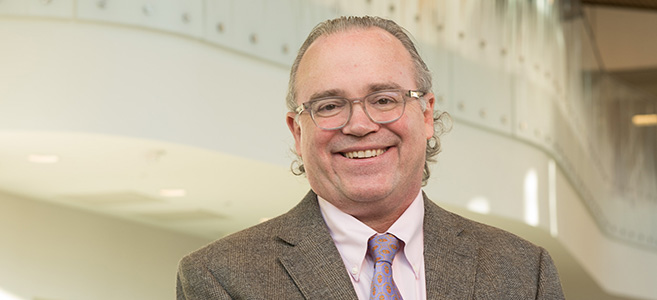
For Dr. Robert Findling, helping kids and adolescents struggling with mental health challenges has been at the center of his career. And, lucky for us and our community, his work isn’t done.
Dr. Findling joined VCU Health as chair of the Department of Psychiatry just over a year ago, and now also serves as the interim medical director of Virginia Treatment Center for Children and interim chair of the Division of Child and Adolescent Psychiatry. A pediatrician and child and adolescent psychiatrist by background, it’s a natural fit.
Mental health is a critical component of the overall health of children – now more than ever. With the COVID-19 pandemic increasing the awareness of and need for pediatric mental health care, Dr. Findling is committed to increasing access to these services through expansion, education and community partnerships.
We asked Dr. Findling about his passion for mental health care, vision for VTCC and more.
I was impressed by how much suffering was present in youngsters with emotional or behavioral challenges. But what was even more impressive was these youths’ ability to heal and get on the right track.
The amount of new knowledge that has been developed is staggering. It’s one of the reasons research is so important. When you do research that focuses on and prioritizes the wellbeing of children, you can help the one child in front of you but you also learn knowledge that can be disseminated to help children all over the world.
We have a commitment to Richmond, but we also want to have an impact that’s universal. If we develop the means by which to achieve better care for kids everywhere, that’s the real privilege of being at an academic medical center. We are committed to giving people the information necessary to make evidence-based decisions.
I went to medical school here and I already knew that Richmond was a great place. The strength of the commitment that both VCU and the health system have for psychiatric care in general, and child and adolescent psychiatry in particular, is second to none. I knew there was a real commitment to the kind of work I love to do.
Traditionally, the field of child psychiatry has focused on caring for children and teens with the most advanced mental health needs. We know mental health is critical for ALL children and teens (and adults!). We also want to focus on children who are in need but maybe not at the most severe side of things by focusing on prevention and resilience. For example, by addressing anxiety early and effectively, it can prevent the impact of the anxiety from becoming more pronounced.
We want to expand our capacity to deliver this care by focusing on our relationships in the community as well as by partnering with other specialists at CHoR. We want to embed our services where the kids are, whether that’s in pediatricians’ offices, schools or CHoR specialty clinics.
We plan to hire more team members and emphasize multiple disciplines – not just psychiatrists and psychologists, but also behavioral health counselors, Master’s-prepared therapists and nurse practitioners. Integrating behavioral health into general medical settings is one of the ways we’ll go about working with children and their families.
My goals can be summarized in two words: access and research. We are committed to doing more for the youngsters and their families here in Richmond than we’ve done before. We must be of our community, not just in our community. Through research, new knowledge we obtain not only helps the young people of Virginia, but can be used to make the lives of suffering children around the world better.
I really have a great job. What a privilege it is for me to go to work each day.
Talk to your pediatrician or family doctor. If, after that discussion, concerns remain, seek help. Most children and teens with mental health needs are never diagnosed and treated, despite the suffering and disability that accompany their conditions. Effective, evidence-based treatments are available – and we know they work.
Access and stigma are often the two biggest barriers to care across the country. It’s important for families to know it’s OK to reach out for help and that they don’t have to be alone on this journey. A child’s mental health is just as important as their physical health. There are medical providers to diagnose and treat broken bones, just as there’s a dedicated team to diagnose and care for mental health needs.
I love my wife. I love my family. We have two Chinese Crested dogs, Minnie and Roo, who are a source of great delight. Jazz and lacrosse are two other things that I really enjoy.
We recognize many children and teens are struggling with mental health needs during the pandemic. Check out these resources to learn more about the rainbow of emotions they might be experiencing, anxiety and depression and how to help, and more.